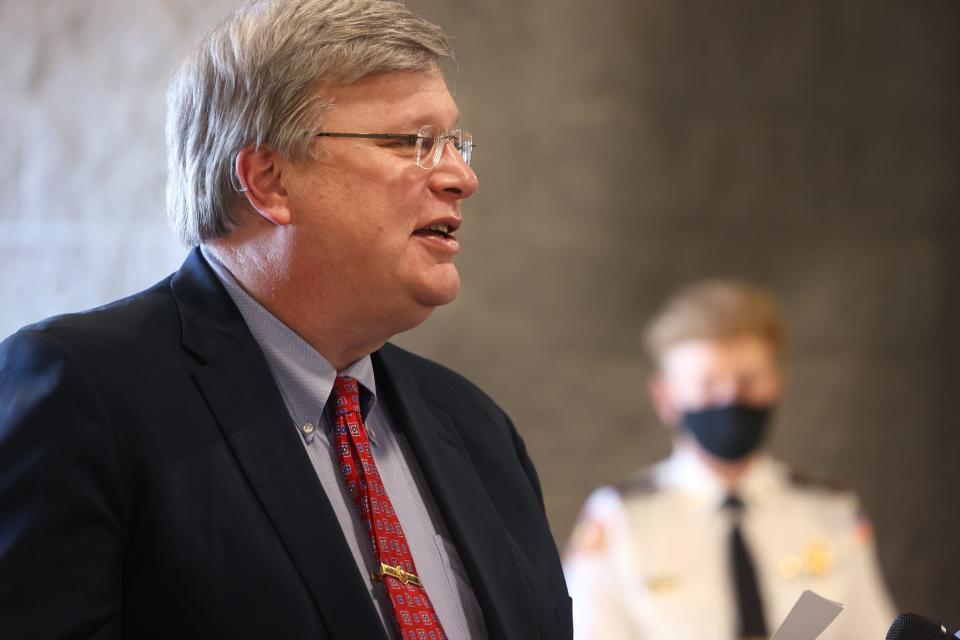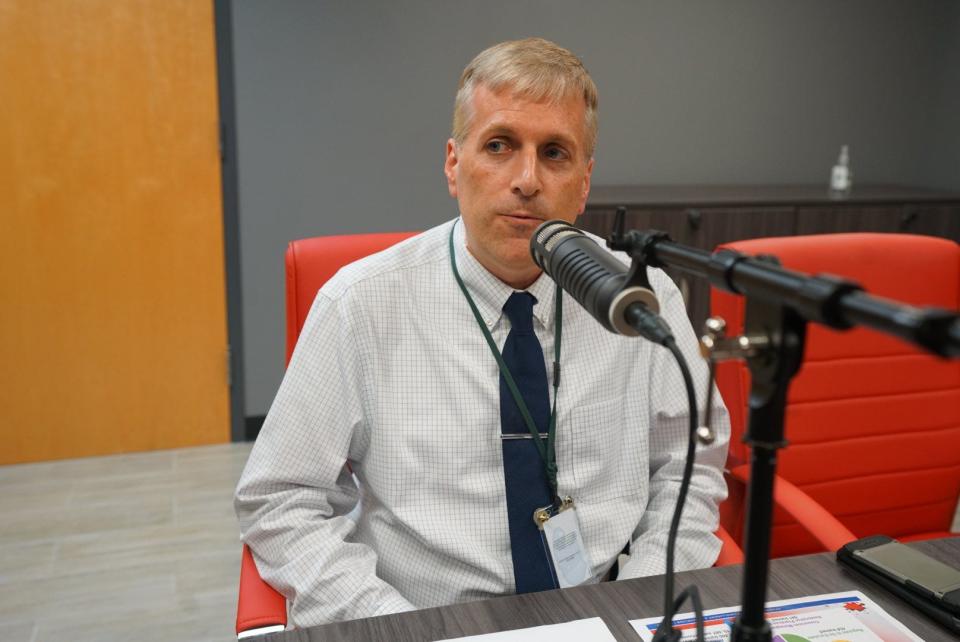MSCS official: Memphis mayor making a 'fallacious' argument about enrollment and crime

A top Memphis-Shelby County Schools official rebuked Memphis Mayor Jim Strickland, saying the mayor was making a "fallacious" argument trying to link the district's enrollment with kids committing crimes.
"I just want to be clear: The notion that the students, that the decline [in enrollment] are causing youth crime, or breaking into houses, I think that is fallacious," Shawn Page, chief of academic operations, said at a district news conference late Wednesday afternoon.
Page also said enrollment data Strickland shared in a newsletter with constituents "were completely wrong." Strickland, for his part, said he got the data in a meeting with the district.
The data Strickland released Friday does not represent MSCS's total enrollment. It is not clear what school population the data released by Strickland encompasses.
While it is true enrollment in district-managed schools has declined in recent years, total MSCS enrollment has not declined as severely — enrollment at MSCS charter schools has increased. In total, the district educates more than 100,000 students.
The school district executive's forceful response follows Strickland using his weekly newsletter last Friday to make a link between the school district enrollment, the number of kids who are truant and what he described as an increase in juvenile crime.

"Parents must be held accountable for their children’s attendance at school, and I hope that the new superintendent will use all legal means to hold parents and children accountable," Strickland said in his newsletter. "The large increase in juvenile crime is certainly directly impacted by more teens out of school without supervision, education, and career plans."
The back-and-forth between the school district and the mayor's office is not a dispute about whether there have been large numbers of kids absent from school. What the district is taking issue with is the idea that increased absences have a direct correlation to increased crime.
It played out between the school district and the mayor's office in the hours before MPD said Ezekiel Kelly, 19, went a shooting spree that left four dead.
In his newsletter, the mayor also shared data from news articles about the number of kids who are truant.
Page, in his comments Thursday, also disputed a few of the truancy figures provided by the mayor, and Strickland's assertion that the district had stopped making truancy referrals to Juvenile Court.
Education news: Absent guidance, Tennessee officials expanded library law to include classroom books
More: Read the letter SCS Superintendent sent to parents about the spike in youth gun violence
While that was the case in January 2021, Page said it occurred because Juvenile Court emailed the district to say it was not taking referrals at that time. Once the pause was lifted, MSCS began making truancy referrals again, sending a reported 400 in 2021, and a reported 300 so far this academic year, he said.
The goal of truancy laws is not to "criminalize parents," Page said, but to help families overcome any barriers to getting to class.
“The whole idea behind truancy is that if a student is truant we try to figure out what barriers are that are causing the truancy, remove those, support the family, and only then report something to juvenile court," he said.
Strickland's newsletter also points to chronic absenteeism figures.

Chronic absenteeism considers all kinds of absences, whether they are unexcused or excused, such as for a documented illness, and also include student suspensions.
Amid COVID-19, attendance rates for students dropped across the country.
And while, like other school districts, MSCS saw enrollment declines amid the pandemic, it is not clear where the enrollment declines happened. The district has not produced a public report showing whether enrollment declines are associated with a particular grade of students.
Strickland, in his newsletter, said "anecdotal evidence would indicate that too many have simply dropped out, disconnected and likely joining the ranks of Opportunity Youth," a population of 16- to 24-year-olds who are not in school and are not working.
When asked about the newsletter around 6 p.m. Wednesday, Strickland repeated much of what he had said.
"We've arrested teenagers for various crimes over the last many months. And many of them have said they're not in school. So it got me thinking what is going on with enrollment and truancy. So I met with the schools," Strickland said. "...I'm just exploring, not blaming schools, but exploring how can we get these young people who have disconnected themselves back to positive opportunities."
Strickland said he received the enrollment figures in a meeting with two school district officials on Aug. 18.The mayor's calendar shows a meeting with Patrice Thomas, the chief of staff for the district on that date. He also said they acknowledged in a meeting that some kids who aren't in school are committing crimes.
Strickland's comments in his newsletter linking crime, school enrollment and truancy data are part of a pattern. For most of the past year, the mayor has used his weekly newsletter as a vehicle for addressing crime and what he and his administration see as the root causes of crime.
For example, Strickland used several newsletters to push for Truth In Sentencing legislation that passed the Tennessee General Assembly this year. The new law mandates people convicted of a wide array of felonies serve 100% or 85% of their sentence.
Two weeks ago, before his comments on truancy and enrollment last week, Strickland said a group of teenagers had broken into cars in his neighborhood and used it to advance the argument that kids charged as juveniles do not receive adequate punishment.
Samuel Hardiman covers Memphis city government and politics for The Commercial Appeal. He can be reached by email at samuel.hardiman@commercialappeal.com or followed on Twitter at @samhardiman.
Laura Testino covers education and children's issues for the Commercial Appeal. Reach her at laura.testino@commercialappeal.com or 901-512-3763. Find her on Twitter: @LDTestino
This article originally appeared on Memphis Commercial Appeal: MSCS official: Memphis mayor is wrong about about enrollment, crime

